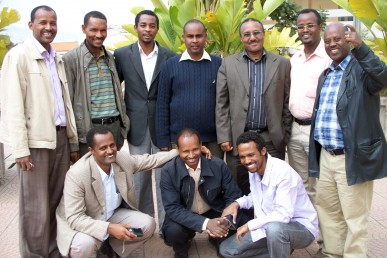Partners for Ethiopia
Video: Josua Clark / Editing: Alex Rauch
Alice Butterfield said she sees her work with the Social Work Education in Ethiopia Partnership — a university-to-university partnership between UIC and Addis Ababa University that established a new school of social work — as empowering the disadvantaged of the second most-populous nation in Africa.
With a small planning grant in 2001, she and other faculty volunteers in the U.S. have been helping train faculty at Addis Ababa University to teach and work in the field of social work.
Now, 11 years later, Addis Ababa University has developed the full range of social work education, starting with Ethiopia’s first master’s of social work degree in 2004, followed by the country’s first Ph.D. program in 2006 and a bachelor’s degree program in 2008.
Butterfield, professor in UIC’s Jane Addams College of Social Work, said she was influenced by high school and college professors who saw education and service as a way to address poverty, social injustice and racism.
“I grew up in South Dakota — a state not known for social activism,” she said. “I was influenced by the values of my family and our small town community. If there was a need or a problem, people came together and figured out how to solve it. It was a kind of social entrepreneurship type of environment in the whole community.
“From this I took on the idea that just a few people working together could make a difference, and that that difference could last a long time — even for generations.”
Butterfield said that she was drawn to the idea of the partnership, called SWEEP, because it is not productive or cost efficient to send Ethiopian students outside the country for their education.
“Many students who are educated outside of Ethiopia never return,” she explained. “This situation creates a terrible brain drain on the country’s limited resources.”
Butterfield said she understands that international students are an important part of the student body of any university in the United States. But she believes such efforts are not the answer for a developing country that literally has no capacity in a given profession.
“The idea is to build the capacity of faculty in Africa to teach now in the many new and emerging schools of social work throughout the country,” she said.

The Social Work Education in Ethiopia Partnership — a partnership between UIC and Addis Ababa University — helps empower the disadvantaged of the second most-populous nation in Africa.
From 39 to 235 graduates in six years
Butterfield is one of several UIC faculty members who volunteered for SWEEP, which uses an extensive two-way faculty exchange for needs assessment and planning, as well as the co-development of a curriculum framework, course outlines, teaching materials and teaching support.
The curriculum prepares professional social workers to manage community-based services and develop new programs in health, poverty reduction, child welfare, HIV/AIDS and community development, Butterfield said.
Addis Ababa University opened a new school of social work in 2004. There were 39 MSW graduates in its first class in 2006; six years later, 235 students had received MSW degrees, Butterfield said.
Earlier this year, the UIC College of Social Work turned a grant from the International Association of Schools of Social Work into a $50,000 to $60,000 project through in-kind and direct donations from Addis Ababa University, Dominican University and UIC. The group developed a month-long travel and study program for 12 people from Ethiopia to Washington, D.C., and Chicago.
In November, 11 doctoral students and the head of social work at Addis Ababa University arrived in Chicago. They met with faculty and worked on cross-cultural papers in their areas of research. They visited programs that work with ex-offenders, persons with disabilities, urban youth, community policing, entrepreneurship and community development .
“As an individual with a disability, I have been challenged with various barriers in my education, private life, and in gaining opportunities and services which are open to all at least in principle,” said Mindahun Gebretsadik, a Ph.D. student at Addis Ababa University who is blind.
“I used to think that if there had been enough social workers, our lives would have been better. As a result, I decided to study social work and make a contribution in making a difference in the lives of many people with disabilities.”
Adugna Abebe, another Ph.D. student from Addis Ababa, taught community psychology before starting his doctoral education.
“In the context of Ethiopia, studying social work helps me to understand and resolve the complex nature of social problems,” he said.
Wassie Kebede, head of the School of Social Work at Addis Abba University, is also the first graduate of the Ph.D. program.
“The SWEEP project is the main reason why we are here today as a school and as social work scholars,” he said.
The results of this international collaboration make Butterfield feel that she is helping change the life situations of vulnerable groups of Ethiopian people, she said.
“When we started work in Ethiopia, there were only two professors of social work,” she said. “Now, there are about 40 doctoral students in Addis Ababa University’s Ph.D. program in social work and social development, and several are about to obtain their doctorates.
“I think I am making a difference in helping to prepare the first generation of social work faculty in Ethiopia.”
